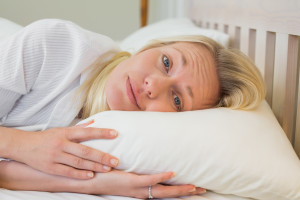
Bloodshot eyes and dark, puffy circles aren’t the only things you’re reaping with those late night hours. A new clinical trial by physician-scientists at Cleveland University Hospital’s Case Medical Center has found that sleep quality directly impacts skin function and aging. *yawn… wait. What?!
The Director of the Skin Study Center at Case Medical Center, Dr. Elma Baron, railed on sleep deprivation saying, “Insufficient sleep has become a worldwide epidemic. While chronic sleep deprivation has been linked to medical problems such as obesity, diabetes, cancer and immune deficiency, its effects on skin function have previously been unknown.” Until now.
The wake-up call study, commissioned by the beauty gurus at Estée Lauder, demonstrated that “poor sleepers” showed increased signs of aging, including slower recovery from the daily environmental stressors that our poor dermises undergo on a daily basis.
“Sleep deprived women show signs of premature skin aging and a decrease in their skin’s ability to recover after sun exposure.” says Baron. Researchers found that women with poor quality sleep tended to remain red after sun exposure for over 72 hours, meaning inflammation was less resolved then in those women who had gotten a proper amount of rest. And it’s not simply the ability to recover from sunburn that suffers from a lack of zzz’s, poor quality sleepers also demonstrated less of an ability to retain moisture, which is essential to healing the skin from other outside stressors. According to the study, the poor sleepers showed increased signs of aging—fine lines, uneven pigmentation and reduced elasticity.
Sleepless nights seem to lend a psychological bent to the equation too, leading the zzz-deprived women in the trials to have a worse assessment of their own appearance, than ladies who enjoy a restful and full night’s sleep.
“This research shows for the first time, that poor sleep quality can accelerate signs of skin aging and weaken the skin’s ability to repair itself at night,” said Dr. Daniel Yarosh, Senior Vice President, Basic Science Research, R&D, at The Estée Lauder Companies. “These connections between sleep and skin aging… will have a profound effect on how we study skin and its functions.”
This article was originally published by Smart Beauty Guide
Questions or want to talk to Dr. Tahernia?
Give us a call: (310) 614-9701